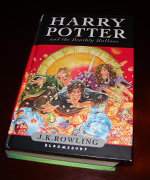 I do like reading. I really do. Admittedly, I don’t always read as much as I would like but recently I have been trying to correct that. In fact, I just re-read Harry Potter and the Deathly Hallows in anticipation of seeing the film in the theater. As I don’t own a copy of the book, I had to borrow it from a friend.
I do like reading. I really do. Admittedly, I don’t always read as much as I would like but recently I have been trying to correct that. In fact, I just re-read Harry Potter and the Deathly Hallows in anticipation of seeing the film in the theater. As I don’t own a copy of the book, I had to borrow it from a friend.
Over the few days that it took to read the book, I found myself calling the borrowed copy ‘my book.’ Have you seen my book? I am going to spend the next 30 minutes reading my book. Hey! That’s my book! I am reading that — so give it back!
It struck me as a particularly proprietary way to describe what wasn’t really mine at all. It would be even less so had I borrowed it from the public library.
I know that I am not the only one to adopt this tact of temporary ownership when it comes to books. But why do we do this?





Because you took the time to get the item, and are responsible for it while it is in your possession. If you ruined and/or lost the book, you would have to replace it.
Maybe because you’re enjoying the book? (which assumes you are).
Perhaps there wouldn’t be this proprietorship feelings if the book wasn’t interesting to you.
I feel the same way about books — in a way that I would never feel if I borrowed a jacket or a tool from someone. Maybe it has something to do with how a good book draws us in emotionally, psychologically, spiritually, etc. (depending on the book) and so our attachment is greater than it would be with other borrowed inanimate objects.
Has anyone ever borrowed an e-book reader like a Kindle or Nook? Did you feel the same way as discussed here?
I should clarify that my own sense of ownership over a borrowed book only lasts as long as I am reading it. Once I have completed the read, I am more than happy to return it to its rightful owner.
How does this work with e-books?
@ Jordan,
I wondered about that as well … do any of our readers own an e-book reader? I think that some e-book readers/accounts allow for e-books to be loaned for a period of time, before that book expires on the borrower’s reader.